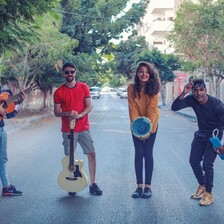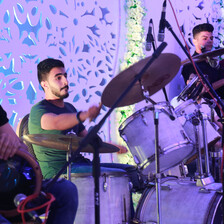The Electronic Intifada 11 April 2025

Saadi Mdoukh
The sky was clear when I arrived at my friend Saadi Mdoukh’s house in the al-Daraj neighborhood of Gaza City in the late afternoon of 5 July 2024.
Saadi, me and two other friends had gathered to celebrate our securing a contract for a new music project which Saadi was going to supervise.
We weren’t just a group of young men trying to make a living. We were dreamers and artists who believed that despite life’s hardships, we could create something meaningful with music.
I met Saadi five years ago through a group of mutual friends. Since then, he became a dear friend to me – he was the brother I never had.
Saadi, 28, was a journalist, music video director and producer. He was the founder of Deep Shot, an independent Palestinian company providing media and digital production services.
Saadi was also the video producer for the nonprofit UNRWA USA, which described his output as “a perfectionist’s work of art.”
With his wife Sabreen, Saadi had two children: Muhammad, 6, and Lubna, 4.
We worked together closely, driven by our passion for music and creativity. Saadi strongly believed in the power of art to express what is in our hearts.
Saadi’s latest artistic activities were with Sol Band, a Palestinian group which blends folk, pop and traditional Arabic music. Saadi was producing video clips for the band before the Israeli attacks began in October 2023.
Despite financial constraints, constant power outages, limited equipment and the ever-present threat of bombings, Saadi never stopped encouraging us to pursue our love of music – even when others tried to discourage us.
He would say, “If we don’t express ourselves, who will? We create hope for ourselves.”
Saadi was always the first to smile, making sure we didn’t lose sight of our dreams of producing high-quality music reflecting the struggles and resilience of the Palestinian people.
Making it
As we were celebrating that day in July 2024, Saadi told me with a laugh, “You opened a door for us to live, not just to earn money. You made this happen.”
Saadi knew that my role in the contract we were celebrating was pivotal: beside coordinating and producing the musical content, I used my connections in the music scene to help secure the contract, allowing us to support ourselves financially while pursuing our passion.
The contract we secured was a work agreement focused on producing music videos for the band Maqam Gaza and other projects.
Maqam Gaza is a Palestinian musical group that was founded by five music teachers who are now based in Egypt. The band emphasizes Palestinian musical identity through blending traditional and contemporary music while preserving authenticity and heritage.
I was the band’s sound engineer and music producer while Saadi was the director.
We were finally going to be able to support ourselves by pursuing our passion; Saadi was overjoyed.
Explosion changed everything
The afternoon of our celebratory gathering was hot and Saadi insisted that someone go out and buy something cold for everyone.
Iyad Jinina, another of Saadi’s friends, and I agreed to go and buy some cold beverages while both Saadi and Ahmed Sukkar, Saadi’s coworker at Deep Shot and a fellow journalist, stayed at the house.
Iyad and I bought cold drinks and headed back. We were in front of Saadi’s house when I heard a deafening roar and felt the ground shake beneath me.
Then I saw Saadi’s house had been bombed; it was collapsing before my eyes.
We rushed to find our friends; I started calling out for Saadi and Ahmed, but they did not reply.
Dust hung thick in the air. Pieces of the ceiling had crumbled to the floor, mingling with shattered furniture and fragments of glass. The walls were scarred and blackened from the blast.
Then I saw Saadi trapped beneath the wreckage, his body partially covered by heavy fragments of concrete.
His face was pale, his eyes were closed and his blood had seeped onto the surrounding dusty rubble.
The world around me blurred while others who had arrived at the scene tried to help. The sharp smell of dust and smoke filled my lungs as I called Saadi’s name and begged him to hold on.
I was still clutching the bag of drinks I had bought for him in my hand. But he didn’t need the refreshments anymore – he needed medical attention, time and a chance to live.
I dropped to my knees beside him and felt his bloodied arm as I reached for him.
As we carried Saadi around half a mile away to Al Ahli Arab Hospital, I kept repeating: “Hold on, Saadi! We need you! Don’t go!”
But I sensed that Saadi passed away shortly before we reached the hospital.
My feeling was right. As we reached the hospital, a doctor confirmed: “He is gone. May he rest in peace.”
The doctor’s words shattered my world.
Our friend Ahmad Sukkar was also killed. Saadi’s mother, the only other family member at home at the time of the bombing, was injured with fractures in her arm and leg.
The next day, on 6 July, we prayed over Saadi’s body in the mosque.
During the genocidal war, most martyrs were prayed over at hospitals due to the grave danger of gathering in public places. This rare act of prayer in the mosque was a profound and solemn farewell that reflected the community’s deep respect and love for Saadi.
His mother insisted on attending the funeral in a wheelchair despite her injuries. I glanced at her and realized I had no words that could ease her pain and suffering or could make sense of such a loss.
As Saadi’s family members, his friends and I carried him from the mosque to his final resting place, clouds gathered in the sky, shielding us from the sun’s light.
While we were burying Saadi and the last tile was placed on his grave, a few drops of rain fell on us.
I couldn’t cry. I stood there, numb, remembering Saadi’s laughter, his kindness, his unwavering belief in our talents and our band.
Saadi always checked on his friends, whether they remained in the north, were displaced to the south or had left Gaza.
Sometimes Saadi and his father would call an owner of a water delivery truck and pay him to fill jerry cans and distribute them to their neighbors. May God reward every drop of water in Saadi’s balance of good deeds.
Later that day as we were sitting in Saadi’s house of mourning, the place was directly targeted in an Israeli military attack that killed three people and injured several others.
Keeping a dream alive
Shortly before Saadi was killed, Anas, one of the musicians in Maqam Gaza, sent Saadi a copy of lyrics for “Where Are You,” a song about the Israeli genocide. He wanted Saadi’s help with the title sequence for the video.
Months later, some of our remaining mutual friends released the track that Ahmed and Saadi had dreamed of producing. It was both a tribute and a way to ensure that their voices lived on.
“Where Are You?”Where are you
And where am I?
There’s nothing left but longing.
Me and you became lost in the midst of life.
I know nothing about you;
There’s a fire in my heart that never fades
And my wound will never heal, no matter how many years pass.
What happened?
Where is that home?
Where are the eyes that used to protect me,
That with one gaze would strengthen me
And organize my thoughts instantly?
Where is the dream we once had?
All our ambitions from back then –
A small house, safety –
Why was everything destroyed in an instant?
Why do the eyes cry,
And why is my heart lost and burdened?
I live hoping that one day
Those who left will return.
We’ve become two broken souls,
Wandering, defeated.
There’s nothing left for us,
And longing makes the eyes weep.
What does separation bring
But sadness, fear, and trials?
My heart has been torn to pieces.
Where are you, and where am I?
What happened?
Where is it?
Where is that home?
Every time I hear that song, I close my eyes and see Saadi smiling. I hear his voice, steady and full of hope: “Don’t forget the dream. Don’t forget that we lived to create something beautiful.”
Saadi, my dear brother, you may have left this world, but you will live forever in our hearts.
Saed Diab is a sound engineer, music producer and writer in Gaza.


